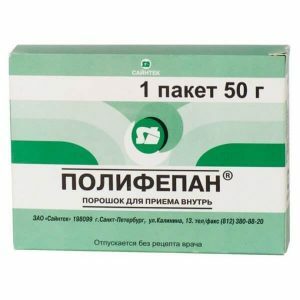Creon: brief instructions for use, analogues
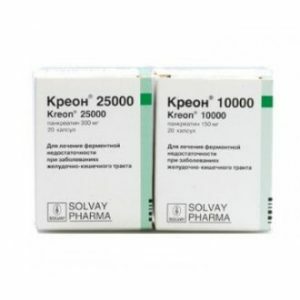
Creon is a medicinal product that belongs to the category of enzymatic, that is, improving digestion.Most often, Creon is used to treat diseases of the gastrointestinal tract, many people use this medication without any prescription from the doctor - "for a better stomach", but this is an absolute mistake!Creon is able to influence the whole of the digestive system quite effectively, that's why it's not necessary to take it for "better digestion of food".
Table of contents:Composition of Creon, the principle of action of
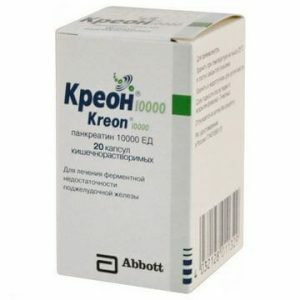 The main active substance of the drug under consideration is pancreatin , from the additional it is possible to isolate cetyl alcohol, gelatin, sodium lauryl sulfate, iron oxide, macrogol, triethyl citrate, hypromellose phthalate.
The main active substance of the drug under consideration is pancreatin , from the additional it is possible to isolate cetyl alcohol, gelatin, sodium lauryl sulfate, iron oxide, macrogol, triethyl citrate, hypromellose phthalate.
Creon is produced in the form of gelatin capsules that have the ability to dissolve very quickly in the stomach - the contents of the capsules mix with the gastric contents, then enter the small intestine and there is already an active release of the main active substance.
Due to pancreatin in the formulation, the drug under consideration differs:
- proteolytic effect - it is able to break down proteins;
- lipolytic effect - can break down fats;
- amylolytic effect - splitting of carbohydrates.
It is noteworthy that Creon is not absorbed by the body( practically), all its effect is in the lumen of the small intestine.
When to take Creon and what is included in the list of contraindications
The only indication for taking the drug in question is enzymatic deficiency. And here this pathological condition can be provoked by the following pathologies:
- cystic fibrosis;
- surgical intervention for the imposition of gastrointestinal anastomosis;
- chronic inflammation of the pancreas( chronic pancreatitis);
- obstruction of the biliary or pancreas, which is triggered by an oncologic or benign neoplasm localized in the pancreas;
- recovery period after gastrectomy;
- Syndrome of Schwamman-Diamond;
- recovery period after pancreatectomy.
In general, Creon is recommended for use by all patients who have pancreatic enzyme deficiency, and it does not matter which pathology this condition provoked.
There are also contraindications to the use of Creon - they are all indicated in the official instruction:
- pancreatic hyperfunction on the background of acute pancreatitis;
- Individual intolerance or specific sensitivity to pancreatin, ancillary components.
Pregnancy is considered a contraindicated contraindication, since no special studies on the effect of the drug under consideration on the state of the future mother and intrauterine development of the fetus have been conducted, the doctors prefer not to take risks. On the other hand - Creon acts locally, not absorbed into the bloodstream, which means it can not penetrate the placenta or fetus.In any case, the expediency of using the presented enzymatic agent for a pregnant woman is determined only by the gynecologist.
How to take Creon
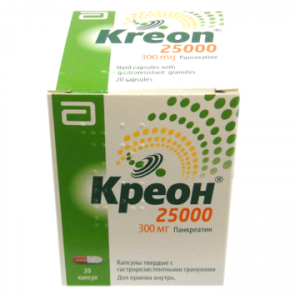 The agent in question is administered only on an individual basis, taking into account which disease led to enzymatic deficiency.To make it convenient to select a dosage, the pharmacological industry produces Creon with different contents of the main active ingredient in the capsules - there is Creon 10 000, 25 000.
The agent in question is administered only on an individual basis, taking into account which disease led to enzymatic deficiency.To make it convenient to select a dosage, the pharmacological industry produces Creon with different contents of the main active ingredient in the capsules - there is Creon 10 000, 25 000.
Capsules can be consumed during meals, it can even be a light snack.According to the instruction it is supposed to swallow the whole capsule without chewing, but if this is not possible, you can open the capsule, pour its contents into a small amount of yogurt and immediately drink.
Note: treatment with Creon implies the use of a large amount of fluid - the patient should consume at least 2.5 liters of fluid per day.Otherwise, constipation may develop.
The dosages and duration of administration of the medicinal product in question are selected on a case-by-case basis.
Cystic fibrosis
When treating a child under 4 years of age, 1,000 ED of lipase per kilogram of patient mass is prescribed at least 3 times a day, and if the child has already turned 4 years old, the dosage becomes 0. 5 thousand units of lipase per kilogram of weight 3-4 times a day.
As soon as the pronounced symptomatology of cystic fibrosis disappears, the doctors transfer the patient to the maintenance therapy regimen and just here the dosage is selected taking into account the patient's condition, the results of the studies.As a rule, within the framework of maintenance therapy, a maximum of 10,000 U of the drug is administered per day.
Pancreatic function disorders
Usually, this condition is accompanied by enzymatic deficiency, so the appointment of Creon will necessarily be appointed by the attending physician.In most cases, the patient should take 10 000 - 25 000 units of lipase at each meal.If a supportive maintenance course is to be carried out, the dosage will be 20 000 - 75 000 units of lipase at the main meal and 5 000 - 25 000 units of lipase during each additional one.
Adverse events
This medication is usually taken for a long time, but even this does not provoke the development of any side effects.Very rarely there may be diarrhea and some light rashes on the skin( allergic reaction).
Despite the fact that Creon has a lot of useful properties and almost no contraindications, the pharmacological industry produces quite a lot of its analogues, which are identical in effect.
Analogs of Creon
Micrazim
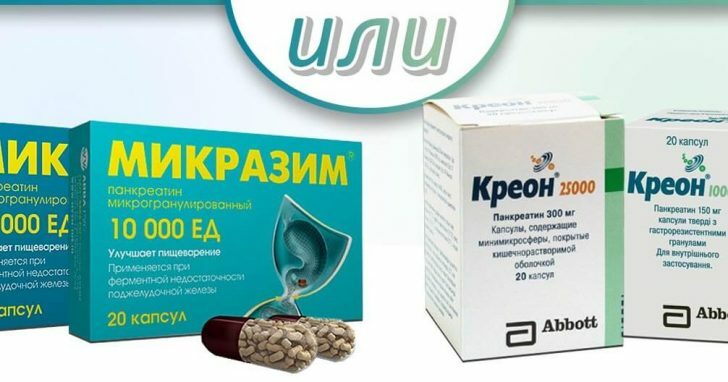
This is the last generation enzymatic preparation containing pancreatin and acting in the small intestine.The Mikrazim capsule dissolves in the stomach after 2 minutes, and the proper effect is observed after 40 minutes. The considered analogue of Creon is adopted with:
- inflammatory process in the pancreas of a chronic nature;
- functional dyspepsia;
- disorders of the masticatory function;
- cystic fibrosis;
- diseases of the liver, thick / small intestine, gallbladder and its ducts.
In addition, Mikrazim is included in the complex therapy, which is carried out in the recovery period after the operative treatment for the removal of the gallbladder, intestine, stomach and pancreas.
Dosage and duration of admission are set individually by the attending physician.
Micrazim, unlike Creon, can provoke some side effects:
- discomfort in the anatomical location of the stomach( epigastric region);
- diarrhea or, conversely, constipation;
- rashes on the skin, urticaria;
- increased levels of uric acid in the blood;
- narrowing of the small intestine( extremely rare and only if the use of Mikrasim in large quantities and for a long time).
Hermitage
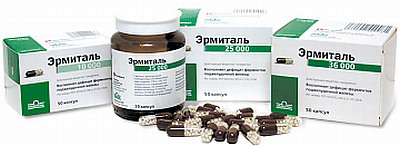
Also an enzyme preparation, the main active ingredient of which is pancreatin. Its action is quite wide and therefore Hermitage is prescribed not only for diseases of the pancreas, but also for the liver - for example, the contemplated analogue of Creon perfectly supports the functionality of the entire digestive system for liver cirrhosis.
Hermitage is recommended for use also to those people who often make inaccuracies in the diet - eat too fatty food, without controlling its quantity, drink alcoholic beverages.Many doctors recommend short courses to take this enzyme drug and people in the elderly / senile age - the functionality of the pancreas is broken due to age-related changes and there may be an enzymatic failure.
There are a number of categorical contraindications to the use of Hermitage:
- pregnancy and the period of breastfeeding;
- chronic pancreatitis in the acute stage;
- acute form of pancreatic inflammation;
- is particularly sensitive to the components of the drug.
Creon is a fairly popular drug that can solve the problem of enzymatic deficiency.Take it yourself, without the appointment of a doctor, it is not necessary - with apparent safety, this tool can and negatively affect the work of the organs of the gastrointestinal tract.
Tsygankova Yana Aleksandrovna, medical reviewer, therapeutist of the highest qualification category


